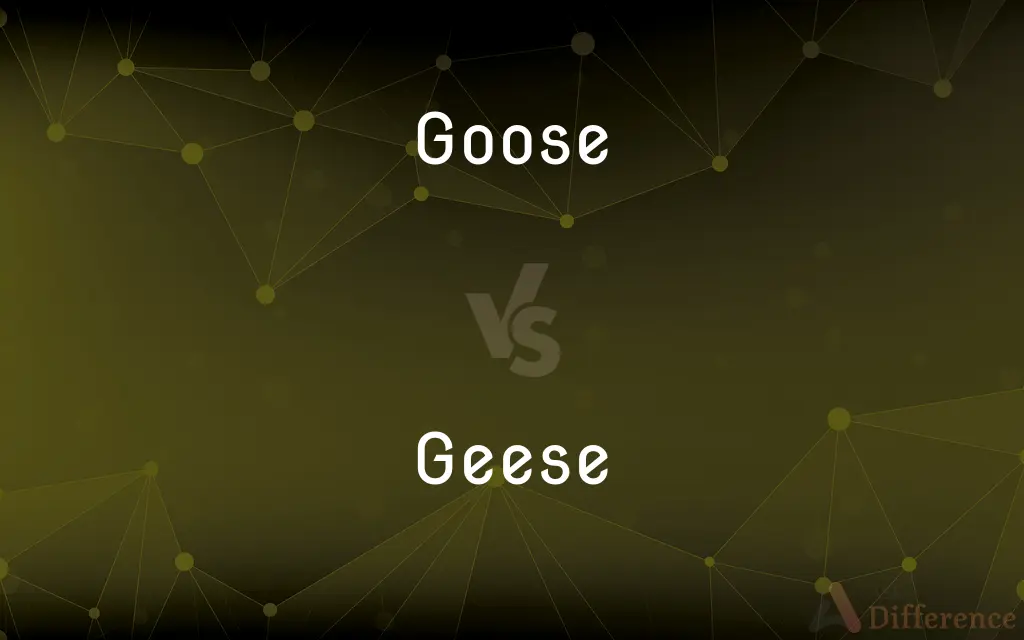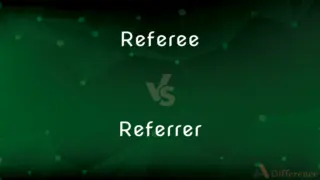Goose vs. Geese — What's the Difference?
Edited by Tayyaba Rehman — By Fiza Rafique — Updated on October 30, 2023
"Goose" is the singular term for a type of waterfowl, while "Geese" is its plural form. They refer to the same bird, but in different quantities.

Difference Between Goose and Geese
Table of Contents
ADVERTISEMENT
Key Differences
"Goose" and "Geese" are terms that denote the same aquatic bird, differing only in the number they represent. A Goose is a singular noun referring to one individual bird of this type. It is a waterfowl known for its characteristic long neck, stout body, and a honking sound. In contrast, Geese is the plural form, pointing towards more than one of these birds. When you observe a group of these waterfowl in a pond or migrating in a characteristic "V" formation in the sky, you're looking at Geese.
When referring to a single bird, perhaps one that's been domesticated or is standing alone by the water's edge, you would use the term Goose. On the other hand, Geese would be used when talking about a flock or group, often seen during migration seasons, traveling in large numbers. These terms not only mark the difference in quantity but are also crucial for grammatical correctness in English.
Additionally, the words Goose and Geese find their roots in Old English. "Goose" comes from the Old English word "gōs," and the shift from "Goose" to "Geese" is an instance of what linguists call "i-mutation" or "umlaut." It's a type of vowel change that's affected several words in English, giving us pairs like "man" and "men" or "tooth" and "teeth."
In daily conversations and literature, you might come across both words quite frequently. You might read about a lost Goose finding its way home or about Geese heralding the onset of winter with their migratory patterns. It's vital to use the appropriate term to ensure clarity and grammatical correctness.
Comparison Chart
Grammatical Number
Singular
Plural
ADVERTISEMENT
Refers to
One bird of this type
More than one bird of this type
Example Usage
"Look at that goose."
"Look at those geese."
Origin
Derived from Old English "gōs"
Plural form due to "i-mutation"
Found In
Individual references, singular constructs
Group references, plural constructs
Compare with Definitions
Goose
A person who is easily tricked or deceived.
Don't be a goose; double-check the facts.
Geese
Plural of goose; multiple birds of the goose type.
The geese migrated south for the winter.
Goose
A poke or prod in a teasing way.
She gave him a playful goose as they waited in line.
Geese
A group or flock of these waterfowl.
We watched in awe as the geese flew overhead in a V formation.
Goose
A goose (plural geese) is a bird of any of several waterfowl species in the family Anatidae. This group comprises the genera Anser (the grey geese and white geese) and Branta (the black geese).
Geese
More than one individual of the bird species related to ducks and swans.
The park is home to many geese throughout the year.
Goose
A large waterbird with a long neck, short legs, webbed feet, and a short broad bill. Generally geese are larger than ducks and have longer necks and shorter bills.
Geese
Birds of this kind collectively.
Geese are known for their migratory patterns.
Goose
A foolish person
‘Silly goose,’ he murmured fondly
Geese
Multiple instances or examples of something, inspired by 'goose.'
He had several geese when it came to investing in stocks.
Goose
A tailor's smoothing iron.
Geese
Plural of goose.
Goose
Poke (someone) in the bottom.
Goose
Give (something) a boost; invigorate
The government's desire to goose the tired housing market
Goose
Any of various wild or domesticated waterbirds of the family Anatidae, and especially of the genera Anser, Branta, and Chen, characteristically having a shorter neck than that of a swan and a shorter, more pointed bill than that of a duck.
Goose
The female of such a bird.
Goose
The flesh of such a bird used as food.
Goose
(Informal) A silly person.
Goose
Pl. goos·es A tailor's pressing iron with a long curved handle.
Goose
(Slang) A poke, prod, or pinch between or on the buttocks.
Goose
To poke, prod, or pinch (a person) between or on the buttocks.
Goose
To move to action; spur
Goosed the governor to sign the tax bill.
Goose
To give a spurt of fuel to (a car, for example); cause to accelerate quickly
"The pilot goosed his craft, powering away" (Nicholas Proffitt).
Goose
Any of various grazing waterfowl of the family Anatidae, which have feathers and webbed feet and are capable of flying, swimming, and walking on land, and which are bigger than ducks.
There is a flock of geese on the pond.
Goose
A female goose (sense 1).
Goose
The flesh of the goose used as food.
Goose
A silly person.
Goose
(archaic) A tailor's iron, heated in live coals or embers, used to press fabrics.
Goose
A young woman or girlfriend.
Goose
An old English board game in which players moved counters along a board, earning a double move when they reached the picture of a goose.
Goose
To sharply poke or pinch the buttocks of (a person).
Goose
(transitive) To stimulate; to spur.
Goose
To gently accelerate (an automobile or machine), or give repeated small taps on the accelerator.
Goose
(UK slang) Of private-hire taxi drivers, to pick up a passenger who has not booked a cab. This is unauthorised under UK licensing conditions.
Goose
To hiss (a performer) off the stage.
Goose
Any large web-footen bird of the subfamily Anserinæ, and belonging to Anser, Branta, Chen, and several allied genera. See Anseres.
Goose
Any large bird of other related families, resembling the common goose.
Goose
A tailor's smoothing iron, so called from its handle, which resembles the neck of a goose.
Goose
A silly creature; a simpleton.
Goose
A game played with counters on a board divided into compartments, in some of which a goose was depicted.
The pictures placed for ornament and use,The twelve good rules, the royal game of goose.
Goose
Web-footed long-necked typically gregarious migratory aquatic birds usually larger and less aquatic than ducks
Goose
A man who is a stupid incompetent fool
Goose
Flesh of a goose (domestic or wild)
Goose
A waterfowl with a long neck and large body.
The goose honked loudly at the intruders.
Goose
A large wild or domesticated bird, related to the duck and swan.
The farm had one goose that would always chase the visitors.
Common Curiosities
Can the word goose refer to something other than a bird?
Yes, "goose" can also mean a tailor's iron or a playful poke.
Are all geese white?
No, while some geese are white, they can also be gray or black, depending on the species.
Can a goose fly?
Yes, geese are known for their long migratory flights.
Do geese mate for life?
Many species of geese mate for life, forming strong bonds with their partners.
Are geese aggressive?
While geese are typically peaceful, they can become aggressive, especially during nesting season.
Is "Goose" used in any idioms?
Yes, like "kill the goose that lays the golden eggs."
What's the habitat of a goose?
Geese inhabit a range of areas including ponds, lakes, rivers, and marshes.
What is a baby goose called?
A baby goose is called a gosling.
Why is it "Geese" and not "Gooses"?
The change from "Goose" to "Geese" is due to historical linguistic processes called "i-mutation" or "umlaut."
Why do geese fly in a V formation?
Flying in a V formation conserves energy and allows for better communication among the geese.
Is a goose larger than a duck?
Generally, yes. Geese are typically larger than ducks.
Can the term "goose" refer to a person?
Yes, in a colloquial sense, calling someone a "goose" might suggest they are silly or foolish.
What do geese eat?
Geese primarily eat grass, grains, and aquatic plants.
Is "Geese" ever used in a singular form?
No, "Geese" is always plural. For singular, you use "Goose."
Why do geese honk?
Geese honk to communicate with each other, especially during flight.
Share Your Discovery

Previous Comparison
Referee vs. Referrer
Next Comparison
Archive vs. DossierAuthor Spotlight
Written by
Fiza RafiqueFiza Rafique is a skilled content writer at AskDifference.com, where she meticulously refines and enhances written pieces. Drawing from her vast editorial expertise, Fiza ensures clarity, accuracy, and precision in every article. Passionate about language, she continually seeks to elevate the quality of content for readers worldwide.
Edited by
Tayyaba RehmanTayyaba Rehman is a distinguished writer, currently serving as a primary contributor to askdifference.com. As a researcher in semantics and etymology, Tayyaba's passion for the complexity of languages and their distinctions has found a perfect home on the platform. Tayyaba delves into the intricacies of language, distinguishing between commonly confused words and phrases, thereby providing clarity for readers worldwide.















































